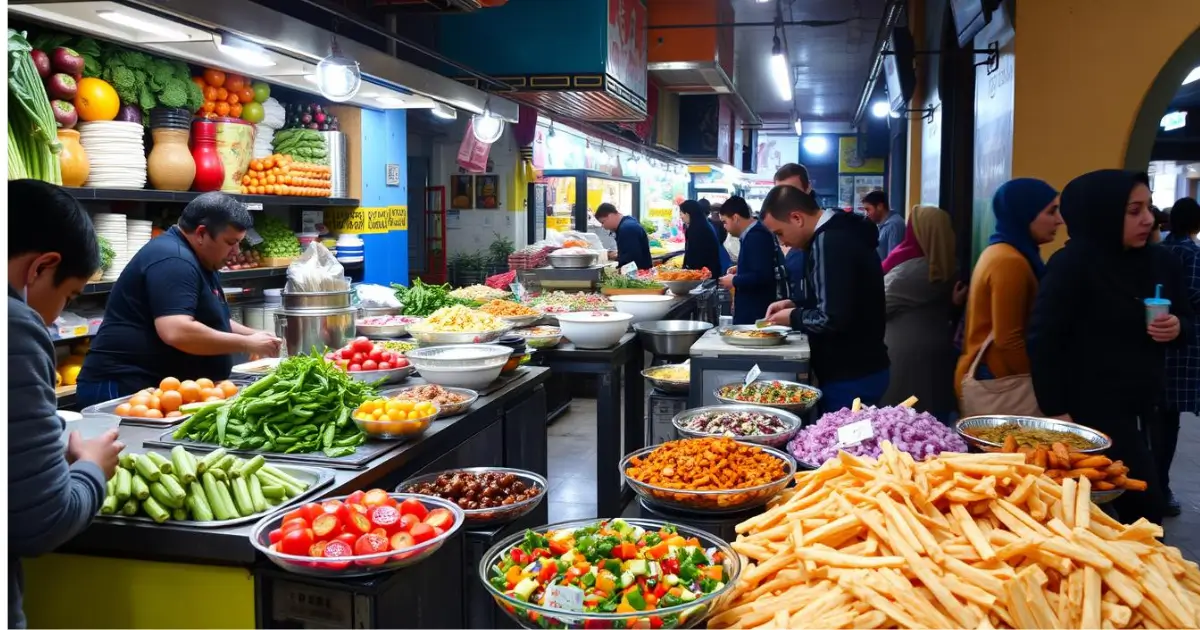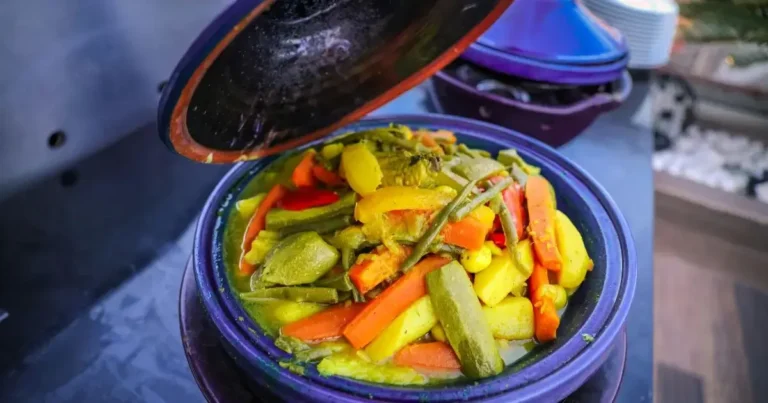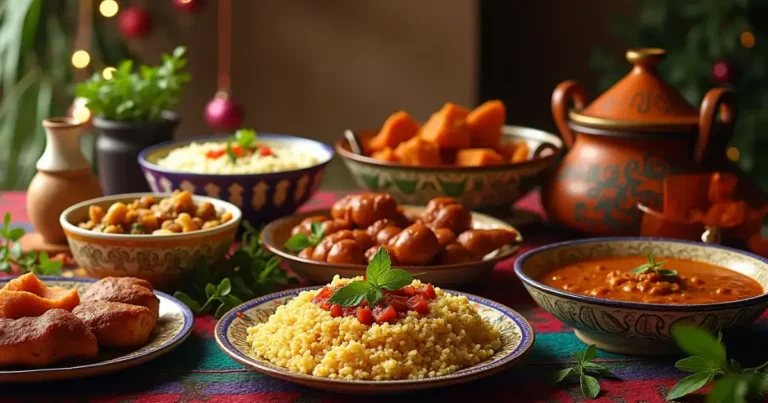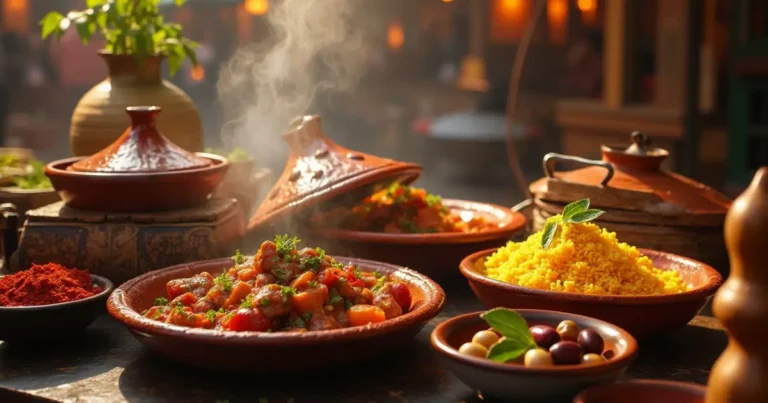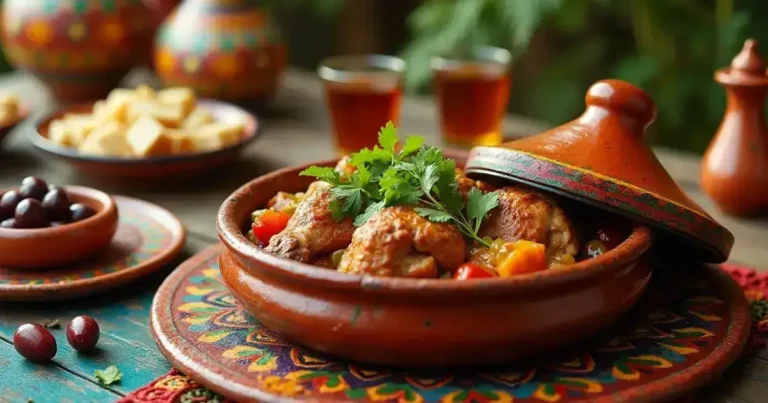Navigating Morocco’s Cuisine: Street Food & Salad Safety
Table of Contents
Exploring Morocco’s Cuisine scene is an exciting adventure. You’ll discover a world of flavors and traditions. But, it’s important to know how to stay safe when trying street food and salads.
Moroccan food is a mix of Berber, Arabic, and Mediterranean tastes. The street food is full of spices and fresh ingredients. Yet, it’s key to be careful about where and what you eat to stay healthy.
This guide will help you enjoy Morocco’s street food and salads safely. You’ll learn about local customs and how to find safe places to eat. Get ready for a delicious journey through Morocco’s food scene.
Key Takeaways
- Learn critical food safety strategies specific to Moroccan cuisine
- Understand the importance of ingredient selection and hygiene
- Discover how to enjoy street food safely
- Recognize potential health risks in local food environments
- Prepare for a delightful culinary adventure with confidence
Understanding Moroccan Food Culture and Dining Customs
Exploring Moroccan cuisine is key for travelers. It’s a world of flavors, traditions, and social bonds. It’s more than just food.
The dining experience in Morocco is all about community. Preparing and eating food is a sacred act. It brings people together.
Traditional Eating Habits and Meal Times
Moroccan meals follow a special rhythm. This rhythm shows local customs and food safety:
- Breakfast (petit déjeuner): Light meal with bread, tea, and pastries
- Lunch (déjeuner): Largest meal, served between 1-3 PM
- Dinner (dîner): Evening meal, starts around 8-9 PM
Common Ingredients in Moroccan Cuisine
| Ingredient Category | Key Components | Typical Uses |
| Spices | Cumin, Paprika, Saffron | Tajine seasoning, marinades |
| Proteins | Lamb, Chicken, Fish | Grilled dishes, stews |
| Grains | Couscous, Bread | Side dishes, primary meals |
Cultural Significance of Shared Meals
Sharing food in Morocco is more than just eating. It’s about building trust and friendship. Breaking bread together means you’re part of the community.
“In Morocco, a meal is not just about eating, but about creating connections.” – Moroccan Culinary Expert
Knowing these cultural details helps travelers enjoy Moroccan cuisine. It also keeps them safe while eating.
Morocco Food Safety Tips – Is Street Food or Raw Salad Safe to Eat?
Exploring Moroccan cuisine is an exciting adventure. But, it’s important to know about street food risks. Raw salads need careful thought when trying local foods. Your choices in Morocco can help you enjoy tasty meals safely.
“Eating street food is an art of balance between adventure and caution” – Moroccan Food Safety Expert
Street food in Morocco is tempting but comes with health risks. Markets and stalls offer delicious smells and recipes. But, it’s key to make smart choices about what and where to eat.
- Inspect food preparation areas for cleanliness
- Choose vendors with high customer traffic
- Observe cooking temperatures and fresh ingredients
- Prioritize hot, fully cooked street foods
Raw salads need extra care. Vegetables washed in local water might have bacteria. Choose salads made with bottled water or eaten in clean, reputable places.
| Food Type | Risk Level | Recommended Precautions |
| Street Grilled Meats | Low to Moderate | Ensure fully cooked, high heat preparation |
| Raw Vegetable Salads | High | Verify water source, choose trusted establishments |
| Cooked Street Snacks | Low | Select vendors with clean preparation areas |
Your food journey in Morocco can be safe and fun. Knowing about street food risks and salad safety lets you enjoy real flavors while staying healthy.
Essential Food Safety Guidelines for Morocco Travelers
Exploring Morocco’s vibrant culinary scene needs smart planning. Your health and fun depend on knowing key food safety tips. These tips help you avoid risks on your adventure.
Traveling in Morocco means being careful with food and water. Taking the right steps can lower your risk of getting sick.
Personal Hygiene Practices
- Carry alcohol-based hand sanitizer with at least 60% alcohol content
- Wash hands thoroughly with soap for 20 seconds before eating
- Use disposable wet wipes for quick hand cleaning
- Avoid touching face with unwashed hands
Restaurant Selection Criteria
Choose places to eat based on cleanliness and how busy they are. Look for restaurants where food is made fresh and served hot.
| Safety Indicator | What to Look For |
| Kitchen Visibility | Open kitchen areas with clean preparation spaces |
| Customer Traffic | Busy restaurants with local patrons |
| Food Temperature | Steaming hot dishes served immediately |
Water Safety Measures
Staying safe from waterborne illnesses is key. Always choose sealed bottled water. Avoid tap water, ice cubes, and uncooked items washed in local water.
Remember: When in doubt, boil it, cook it, peel it, or forget it!
Proactive health management makes your Moroccan food journey safe and fun.
Popular Street Food Vendors and What to Look For
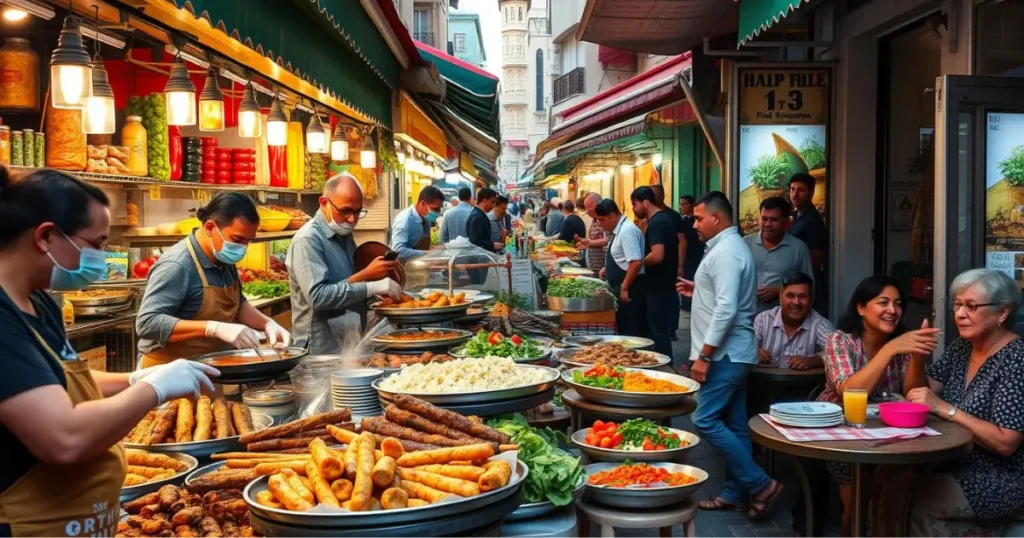
Exploring street food in Morocco is an exciting adventure. But, it’s important to know how to pick safe food. Choosing the right vendor is key to a great dining experience.
Here are some tips for finding the best Moroccan street food:
- High local customer traffic suggests reliable and tasty food
- Clean cooking surfaces and well-maintained stalls
- Food prepared fresh in front of customers
- Vendors wearing clean protective clothing
- Visible food handling practices
When looking for street food, observe carefully. Watch how vendors prepare food, check ingredient freshness, and assess overall cleanliness. Places like Marrakech’s Jemaa el-Fnaa have many vendors, but not all are safe.
“Street food is the heartbeat of Moroccan cuisine – choose wisely and enjoy!” – Moroccan Food Expert
Look for vendors who specialize in certain dishes. They usually have more expertise and quality. Grilled meats, freshly baked breads, and hot tajines are safer choices in Morocco.
- Recommended safe street foods:
- Grilled kebabs
- Freshly baked bread
- Hot tajines
- Roasted nuts
Your health is the most important thing. Trust your instincts and choose vendors who are professional and clean.
Safe Street Food Options in Moroccan Markets
Exploring Morocco’s street food scene is thrilling. With the right tips, you can enjoy tasty local dishes safely. Street markets are full of flavors, but picking safe food is key for travelers.
When you’re in the markets, plan ahead and watch closely. You want to try real Moroccan food and stay healthy.
Best Times to Visit Food Stalls
Choosing the right time to eat street food is important. Here’s what to do:
- Go during busy lunch hours (12-2 PM)
- Find stalls with lots of customers
- Look for stalls where food is prepared openly
- Stay away from stalls open late with old food
Signs of Fresh Ingredients
Finding fresh ingredients is crucial for safe eating in Morocco. Look for these signs:
- Ingredients kept on ice or in coolers
- Clean areas where food is made
- Food cooked right when you order it
- Vendors wearing gloves and keeping clean
Popular Safe Street Snacks
Some street foods are safer for visitors:
- Msemen (Moroccan flatbread) – made fresh
- Grilled meats from busy stalls
- Hot harira soup
- Roasted nuts and dried fruits
“When in doubt, choose hot, freshly prepared foods and avoid raw or uncooked items.” – Moroccan Food Safety Expert
By using these tips, you can enjoy Moroccan street food safely. This way, you can have a great time trying new foods while staying healthy.
Raw Salads and Fresh Produce: Making Smart Choices
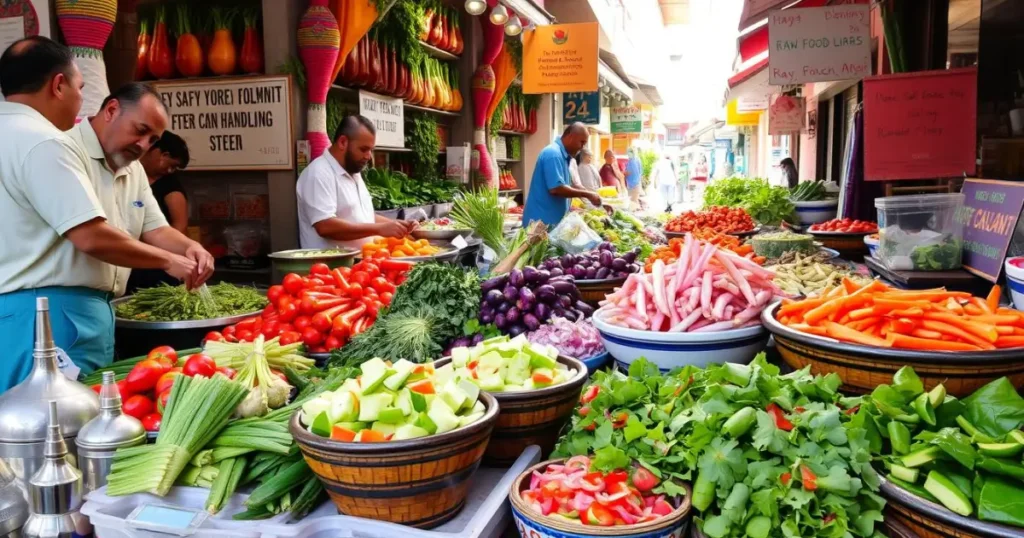
Exploring Moroccan cuisine means being careful about raw salad safety. The markets and street vendors have fresh produce that’s tempting. But knowing about food hygiene in Morocco can help you avoid health risks.
“Enjoying local cuisine is about making informed choices, not avoiding experiences.” – Moroccan Travel Guide
Raw salad safety in Morocco needs your attention. Here are some important steps to follow:
- Inspect vegetables for freshness and cleanliness
- Prioritize cooked or peelable produce
- Avoid pre-cut salads from street vendors
- Wash produce with purified water
Food hygiene in Morocco can differ a lot. Some restaurants are very clean, while street vendors might not be as careful.
| Produce Type | Safety Level | Recommended Action |
| Leafy Greens | High Risk | Avoid or thoroughly wash |
| Citrus Fruits | Low Risk | Peel before consuming |
| Root Vegetables | Medium Risk | Wash or cook thoroughly |
Pro tip: When in doubt, choose cooked vegetables or fruits you can peel yourself to minimize potential food safety risks.
Common Food-borne Illnesses and Prevention
Traveling to Morocco offers a chance to try new foods, but it also has health risks. It’s important to know how to prevent traveler’s diarrhea and avoid food poisoning. This will help you have a safe and fun trip.
Morocco’s food can sometimes upset your stomach. Knowing the signs and how to prepare can keep you healthy on your trip.
Symptoms to Watch For
Your body might show signs of food illness in several ways:
- Sudden onset of watery diarrhea
- Abdominal cramps and pain
- Nausea and potential vomiting
- Low-grade fever
- Dehydration signs
Emergency Medical Resources
When in Morocco, be ready for medical emergencies by:
- Researching local clinics in advance
- Carrying travel health insurance
- Knowing emergency contact numbers
- Locating international medical facilities
Preventive Medications
Here are some ways to prevent food-related health issues:
| Medication Type | Purpose | Recommended Dosage |
| Probiotics | Strengthen gut health | Daily supplement |
| Antibiotics | Emergency treatment | Consult healthcare provider |
| Oral Rehydration Salts | Prevent dehydration | As needed |
“Prevention is always better than cure when exploring new cuisines.” – Travel Health Expert
Stay informed, prepared, and cautious to ensure your Moroccan culinary journey remains a delightful experience.
Clean Water Sources and Drink Safety
Finding clean water in Morocco is key to staying healthy. Knowing how to stay safe with water is important for a good trip.
Look for safe drinking options. Tap water in some cities might have bacteria that can upset your stomach.
“When in doubt, bottled is best” – Moroccan Travel Health Guide
- Choose sealed bottled water from reputable brands
- Avoid tap water for drinking and brushing teeth
- Use bottled water for ice cubes in beverages
- Check restaurant water sources before consuming
There are many ways to get clean water in Morocco. Brands like Sidi Ali and Oulmes offer safe water for travelers.
| Water Source | Safety Level | Recommended Action |
| Tap Water | Low Safety | Avoid direct consumption |
| Bottled Water | High Safety | Recommended for drinking |
| Boiled Water | Medium Safety | Safe if boiled for 1-3 minutes |
Always carry bottled water to stay hydrated. Street vendors and restaurants can give you sealed water bottles. This keeps your health safe during your trip.
Recommended Restaurants and Trusted Establishments
Finding safe and tasty places to eat is key in Morocco’s lively food scene. Look for restaurants that focus on cleanliness and quality. This ensures a memorable and safe meal.
Choosing restaurants in Morocco wisely is important. You want places that keep their kitchens and food preparation areas clean.
Top-Rated Safe Dining Spots in Major Cities
Morocco has many trusted places to eat that offer quality and safety:
- Café Clock in Marrakech – Known for exceptional hygiene and authentic cuisine
- La Maison Arabe in Marrakech – International standard restaurant with strict food safety protocols
- Dar Roumana in Fez – Elegant venue with meticulous kitchen standards
International Standard Venues
| Restaurant | City | Cuisine Type | Safety Rating |
| Nomad | Marrakech | Modern Moroccan | Excellent |
| Le Comptoir Darna | Marrakech | Fusion | Very Good |
| La Sqala | Casablanca | Traditional Moroccan | Good |
Local Gems with Good Hygiene
Exploring Morocco’s food scene also means trying local spots. Street food can be safe if you know what to look for.
“Clean restaurants are the gateway to an authentic Moroccan culinary experience” – Local Food Safety Expert
When picking restaurants, look for places with open kitchens and clean environments. High customer turnover is a good sign. Your food choices in Morocco will shape your dining adventure.
Traveling with Food Allergies in Morocco
When you have food allergies, navigating Moroccan cuisine is key. Travelers with dietary needs must find safe ways to enjoy Morocco’s food. This is crucial for a good trip.
Knowing what might cause an allergic reaction is important. Moroccan dishes often have nuts, dairy, and wheat. These can be big allergy triggers.
“Preparation and communication are your best tools for safe dining in Morocco” – Travel Health Expert
- Carry translation cards explaining your specific allergies in Arabic and French
- Pack emergency medication like antihistamines and epinephrine auto-injectors
- Research common ingredients in local dishes
- Learn key phrases to communicate your dietary needs
For those with allergies, paying attention to food hygiene in Morocco is vital. Restaurant staff might not get the risks of cross-contamination. So, being ahead of the game is key.
| Common Allergens | Moroccan Dishes to Avoid |
| Nuts | Pastilla (contains almonds) |
| Dairy | Harissa (may contain yogurt) |
| Wheat | Couscous |
Pro tip: Always request ingredient lists and explain your allergies before ordering.
Conclusion
Exploring Morocco’s food scene is exciting and requires careful planning. By following these tips, your food journey will be unforgettable. Your health and happiness are key when trying street foods and traditional dishes.
Choosing safe food in Morocco means being aware and planning ahead. Knowing local customs, finding trusted vendors, and keeping clean can help avoid health issues. Every meal is a chance to dive into Morocco’s food culture while staying safe.
Your trip should mix caution with fun. By using the advice in this article, you’ll feel ready to explore Morocco’s food world. Enjoying great flavors while staying healthy makes every bite a cultural adventure.
With the right preparation and careful eating, your Moroccan food adventure will be both safe and amazing. Enjoy the local food, trust your gut, and cherish every moment of your food journey in this incredible place.
FAQ
Is street food safe to eat in Morocco?
Street food can be safe if you follow certain guidelines. Look for busy stalls with lots of customers. Make sure food is cooked well and served hot. Also, watch how the vendor keeps things clean.
Avoid raw or undercooked meats. Choose vendors who have many local customers.
What are the biggest food safety risks in Morocco?
The main risks include traveler’s diarrhea and contaminated water. Also, raw or unwashed produce and street foods not prepared right can be dangers. Be careful with water sources and choose restaurants that are clean.
Avoid unpeeled fruits and raw veggies unless you can wash them with bottled water.
How can I prevent getting sick from food in Morocco?
To stay healthy, drink only bottled or boiled water. Avoid ice cubes and eat foods that are cooked well. Choose restaurants that are clean and wash your hands often.
Carry hand sanitizer. Stick to hot, fresh foods and avoid raw salads unless you’re sure they’re safe.
Are raw salads safe to eat in Moroccan restaurants?
Raw salads can be risky because of water contamination. If you want to try salads, pick reputable restaurants. Ask if they use bottled water to wash veggies.
Or, choose cooked vegetable dishes instead. When in doubt, it’s better to avoid raw produce.
What should I do if I get food poisoning in Morocco?
Stay hydrated with bottled water or oral rehydration solutions. Rest and avoid solid foods at first. For mild cases, use over-the-counter meds like Imodium.
If symptoms are severe (high fever, persistent vomiting, bloody stools), get medical help right away. Consider travel insurance that covers medical emergencies.
Is tap water safe to drink in Morocco?
No, tap water is not safe for tourists. Always drink bottled water. Use it for brushing teeth too. Avoid ice cubes in drinks and be careful with fresh juices that might use tap water.
Sealed bottled water is your safest choice for staying hydrated.
What are the safest street foods to eat in Morocco?
Some safe street foods include freshly grilled meats (like kebabs), hot tagines, bread, and foods cooked at high temperatures right in front of you. Look for stalls that cook food quickly and serve it hot.
Boiled or grilled items are usually safer than raw or cold foods.
How can I communicate food allergies in Morocco?
Learn key phrases in Arabic or French to explain your allergies. Carry translation cards that clearly describe your dietary restrictions. When possible, have a local or your hotel staff help you communicate with restaurant staff.
Consider bringing allergy medication and a medical alert bracelet.

